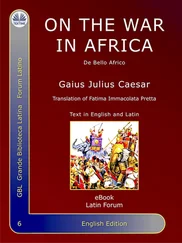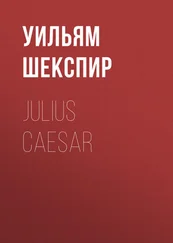Napoleon III - History of Julius Caesar Vol. 1 of 2
Здесь есть возможность читать онлайн «Napoleon III - History of Julius Caesar Vol. 1 of 2» — ознакомительный отрывок электронной книги совершенно бесплатно, а после прочтения отрывка купить полную версию. В некоторых случаях можно слушать аудио, скачать через торрент в формате fb2 и присутствует краткое содержание. Жанр: foreign_antique, foreign_prose, Биографии и Мемуары, на английском языке. Описание произведения, (предисловие) а так же отзывы посетителей доступны на портале библиотеки ЛибКат.
- Название:History of Julius Caesar Vol. 1 of 2
- Автор:
- Жанр:
- Год:неизвестен
- ISBN:нет данных
- Рейтинг книги:5 / 5. Голосов: 1
-
Избранное:Добавить в избранное
- Отзывы:
-
Ваша оценка:
- 100
- 1
- 2
- 3
- 4
- 5
History of Julius Caesar Vol. 1 of 2: краткое содержание, описание и аннотация
Предлагаем к чтению аннотацию, описание, краткое содержание или предисловие (зависит от того, что написал сам автор книги «History of Julius Caesar Vol. 1 of 2»). Если вы не нашли необходимую информацию о книге — напишите в комментариях, мы постараемся отыскать её.
History of Julius Caesar Vol. 1 of 2 — читать онлайн ознакомительный отрывок
Ниже представлен текст книги, разбитый по страницам. Система сохранения места последней прочитанной страницы, позволяет с удобством читать онлайн бесплатно книгу «History of Julius Caesar Vol. 1 of 2», без необходимости каждый раз заново искать на чём Вы остановились. Поставьте закладку, и сможете в любой момент перейти на страницу, на которой закончили чтение.
Интервал:
Закладка:
The curia, into which a certain number of gentes entered, was then the basis of the political and military organisation, and hence originated the name of Quirites to signify the Roman people.
The members of the curia were constituted into religious associations, having each its assemblies and solemn festivals which established bonds of affiliation between them. When their assemblies had a political aim, the votes were taken by head; 32 32 Titus Livius, 1. 43.
they decided the question of peace or war; they nominated the magistrates of the town; and they confirmed or abrogated the laws. 33 33 Dionysius of Halicarnassus, II. 14, and IV. 20.
The appeal to the people, 34 34 “The appeal to the people existed even under the kings, as the books of the pontiffs show.” (Cicero, De Republica , II. 31.)
which might annul the judgments of the magistrates, was nothing more than the appeal to the curia; and it was by having recourse to it, after having been condemned by the decemvirs, that the survivor of the three Horatii was saved.
The policy of the kings consisted in blending together the different races and breaking down the barriers which separated the different classes. To effect the first of these objects, they divided the lower class of the people into corporations, 35 35 Plutarch, Numa , 17. – Pliny, Natural History , XXXIV. 1.
and augmented the number of the tribes and changed their constitution; 36 36 “Servius Tullius conformed no longer as aforetime to the ancient order of three tribes, distinguished by origin , but to the four new tribes which he had established by quarters .” (Dionysius of Halicarnassus, IV. 14.)
but to effect the second, they introduced, to the great discontent of the higher class, plebeians among the patricians, 37 37 Dionysius of Halicarnassus, III. 61. – Titus Livius, I. 35.
and raised the freedmen to the rank of citizens. 38 38 Dionysius of Halicarnassus, IV. 22.
In this manner, each curia became considerably increased in numbers; but, as the votes were taken by head, the poor patricians were numerically stronger than the rich.
Servius Tullius, though he preserved the curiæ, deprived them of their military organisation, that is, he no longer made it the basis of his system of recruiting. He instituted the centuries, with the double aim of giving as a principle the right of suffrage to all the citizens, and of creating an army which was more national, inasmuch as he introduced the plebeians into it; his design was indeed to throw on the richest citizens the burden of war, 39 39 Dionysius of Halicarnassus, IV. 19. “Servius Tullius, by these means, threw back upon the richest all the costs and dangers of war.” (Dionysius of Halicarnassus, IV. 20.)
which was just, each equipping and maintaining himself at his own cost. The citizens were no longer classified by castes, but according to their fortunes. Patricians and plebeians were placed in the same rank if their income was equal. The influence of the rich predominated, without doubt, but only in proportion to the sacrifices required of them.
Servius Tullius ordered a general report of the population to be made, in which every one was obliged to declare his age, his fortune, the name of his tribe and that of his father, and the number of his children and of his slaves. This operation was called census . 40 40 “If Numa was the legislator of the religious institutions, posterity proclaims Servius as the founder of the order which distinguishes in the Republic the difference of rank, dignity, and fortune. It was he who established the census , the most salutary of all institutions for a people destined to so much greatness. Fortunes, and not individuals, were called upon to support the burdens of the State. The census established the classes, the centuries, and that order which constitutes the ornament of Rome during peace and its strength daring war.” (Titus Livius, I. 42.)
The report was inscribed on tables, 41 41 Dionysius of Halicarnassus, IV. 16.
and, once terminated, all the citizens were called together in arms in the Campus Martius. This review was called the closing of the lustrum , because it was accompanied with sacrifices and purifications named lustrations . The term lustrum was applied to the interval of five years between two censuses. 42 42 “When Servius Tullius had completed the taking of the census, he ordered all the citizens to assemble in arms in the greatest of the fields situated near the town, and, having arranged the horsemen in squadrons, the footmen in phalanx, and the light-armed men in respective orders, he submitted them to a lustration, by the immolation of a bull, a ram, and a he-goat. He ordered that the victims should be led thrice round about the army, after which he sacrificed to Mars, to whom this field was dedicated. From that epoch to the present time the Romans have continued to have the same ceremony performed, by the most holy of magistracies, at the completion of each census; it is what they call a lustrum . The total number of all the Romans enumerated, according to the writing of the tables of the census, gave 300 men less than 85,000.” (Dionysius of Halicarnassus, IV. 22.)
The citizens were divided into six classes, 43 43 “This good order of government (under Servius Tullius) was sustained among the Romans during several centuries, but in our days it has been changed, and, by force of circumstances, has given place to a more democratic system. It is not that the centuries have been abolished, but the voters were no longer called together with the ancient regularity, and their judgments have no longer the same equity, as I have observed in my frequent attendance at the comitia.” (Dionysius of Halicarnassus, IV. 21.)
and into a hundred and ninety-three centuries, according to the fortune of each, beginning with the richest and ending with the poorest. The first class comprised ninety-eight centuries, eighteen of which were knights; the second and fourth, twenty-two; the third, twenty; the fifth, thirty; and the sixth, although the most numerous, forming only one. 44 44 “The poorest citizens, in spite of their great number, were the last to give their vote, and made but one century.” (Dionysius of Halicarnassus, IV. 21.)
The first class contained a smaller number of citizens, yet, having a greater number of centuries, it was obliged to pay more than half the tax, and furnish more legionaries than any other class.
The votes continued to be taken by head, as in the curiæ, but the majority of the votes in each century counted only for one suffrage. Now, as the first class had ninety-eight centuries, while the others, taken together, had only ninety-five, it is clear that the votes of the first class were enough to carry the majority. The eighteen centuries of knights first gave their votes, and then the eighty centuries of the first class: if they were not agreed, appeal was made to the vote of the second class, and so on in succession; but, says Livy, it hardly ever happened that they were obliged to descend to the last. 45 45 Titus Livius, I. 43.
Though, according to its original signification, the century should represent a hundred men, it already contained a considerably greater number. Each century was divided into the active part, including all the men from eighteen to forty-six years of age, and the sedentary part, charged with the guard of the town, composed of men from forty-six to sixty years old. 46 46 “From the age of seventeen years, they were called to be soldiers. Youth began with that age, and continued to the age of forty-six. At that date old age began.” (Aulus Gellius, X. 28. – Dionysius of Halicarnassus, IV. 16.)
Интервал:
Закладка:
Похожие книги на «History of Julius Caesar Vol. 1 of 2»
Представляем Вашему вниманию похожие книги на «History of Julius Caesar Vol. 1 of 2» списком для выбора. Мы отобрали схожую по названию и смыслу литературу в надежде предоставить читателям больше вариантов отыскать новые, интересные, ещё непрочитанные произведения.
Обсуждение, отзывы о книге «History of Julius Caesar Vol. 1 of 2» и просто собственные мнения читателей. Оставьте ваши комментарии, напишите, что Вы думаете о произведении, его смысле или главных героях. Укажите что конкретно понравилось, а что нет, и почему Вы так считаете.












